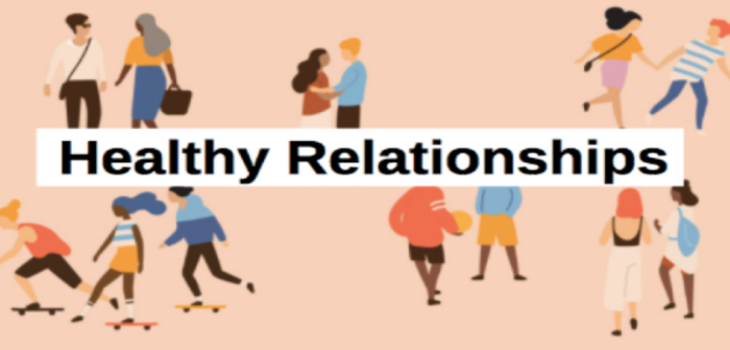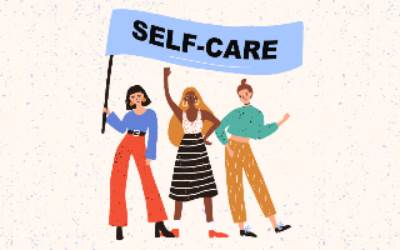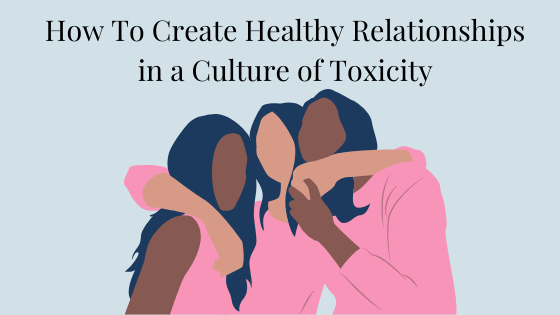
Healthy Relationships


5 Tips to Practice Self Care in your Relationships:
- Take time for you. Time away from your partner or others provides an opportunity to recharge, think or engage in solo activities that bring you personal fulfillment. ...
- Be honest with yourself. ...
- Set healthy boundaries. ...
- Sweep out the toxic. ...
- Heal old wounds...
Domestic Violence Resources
Financial Help for Women in Abusive Relationships

Women who are struggling in abusive relationships don't often know about the resources that can be provided to them. It is also much more challenging to leave a cylcle of domestic abuse, when you can't find the means to succeed outside of the toxic relationship. Most women who are currently facing or have faced domestic abuse feel ashamed and tend to suffer silently. According to the National Domestic Violence Hotline statistics, "about 80% of females [and 20% of males] questioned between 1994 and 2010 have spoken about facing intimate partner violence."
EduBirdie is an online writing platform that has more information about the resources that are available to women in abusive relationships. They have put together a list of temporary housing, food assistance, help finding a job, medical needs, and even scholarships for current college students who have survived domestic abuse. They also have put together tips for when you are planning to leave a abusive situation. Visit the article here.
A couple of important and fully confidential hotlines you may call are:
- Call 911 for general absuse cases and emergency help.
- The National Domestic Violence Hotline number can be reached at 1-800-799-7233.
- Rape, Abuse, and Incest National Network can be encountered by calling: 1-800-656-HOPE.
- Receive immediate legal help and advice by contacting the National Resource Center on Domestic Violence at 1-800-537-2238.
10 Tips for healthy relationships
Healthy relationships have been shown to increase our happiness, improve health and reduce stress. Studies show that people with healthy relationships have more happiness and less stress. There are basic ways to make relationships healthy, even though each relationship is different. These tips apply to all kinds of relationships: friendships, work and family relationships, and romantic partnerships.
- Keep expectations realistic. No one can be everything we might want them to be. Healthy relationships mean accepting people as they are and not trying to change them.
- Talk with each other. It can't be said enough: communication is essential to healthy relationships.
- Take the time. Really be there.
- Genuinely listen. Do not interrupt or plan what you’re going to say next. Try to fully understand their perspective.
- Ask questions. Show you are interested. Ask about their experiences, feelings, opinions, and interests.
- Share information. Studies show that sharing information helps relationships begin. Let people know who you are, but don’t overwhelm with too much personal information too soon.
- Be flexible. It is natural to feel uneasy about changes. Healthy relationships allow for change and growth.
- Take care of yourself, too. Healthy relationships are mutual, with room for both people’s needs.
- Be dependable. If you make plans with someone, follow through. If you take on a responsibility, complete it. Healthy relationships are trustworthy.
- Fight fair. Most relationships have some conflict. It only means you disagree about something; it does not have to mean you don't like each other.
- Cool down before talking. The conversation will be more productive if you have it when your emotions have cooled off a little, so you don’t say something you may regret later.
- Use “I statements.” Share how you feel and what you want without assigning blame or motives. E.g. “When you don’t call me, I start to feel like you don’t care about me” vs. “You never call me when you’re away. I guess I’m the only one who cares about this relationship.”
- Keep your language clear and specific. Try to factually describe behavior that you are upset with, avoiding criticism and judgment. Attack the problem, not the person.
- Focus on the current issue. The conversation is likely to get bogged down if you pile on everything that bothers you. Avoid using “always” and “never” language and address one issue at a time.
- Take responsibility for mistakes. Apologize if you have done something wrong; it goes a long way toward setting things right again.
- Recognize some problems are not easily solved. Not all differences or difficulties can be resolved. You are different people, and your values, beliefs, habits, and personality may not always be in alignment. Communication goes a long way toward helping you understand each other and address concerns, but some things are deeply rooted and may not change significantly. It is important to figure out for yourself what you can accept, or when a relationship is no longer healthy for you.
- Be affirming. According to relationship researcher John Gottman, happy couples have a ratio of 5 positive interactions or feelings for every 1 negative interaction or feeling. Express warmth and affection!
- Keep your life balanced. Other people help make our lives satisfying but they cannot meet every need. Find what interests you and become involved. Healthy relationships have room for outside activities.
- It’s a process. It might look like everyone on campus is confident and connected, but most people share concerns about fitting in and getting along with others. It takes time to meet people and get to know them. Healthy relationships can be learned and practiced, and keep getting better.
- Be yourself! It's much easier and more fun to be authentic than to pretend to be something or someone else. Healthy relationships are made of real people.
What is gaslighting?
Gaslighting is a form of psycological manipulation where the manipulator tries to gain control of the other person by making doubt themselves, their memory, judgement, etc. The manipulator tries to lower the victim's self-esteem, and ultimately makes the victim wonder if they're going crazy. In the end, the victim might start to believe everything the gaslighter tells them even if it is not true. This type of abuse can happen in any type of relationship (dating, marriage, friendships, or even work) and it's important to know the red flags. This type of abuse is considered dangerous because it supresses your sense of self, and it can exasterbate mental health issues such as anxiety and depression. For more information visit the Calmerry Blog here.
Gaslighting Techniques:
- Withholding – the abuser refuses to engage in conversation, pretends they don’t understand you,
refuses to listen, and declines to share their emotions
(e.g. “You are just trying to confuse me”) - Trivializing – the gaslighter belittles or disregards the other person’s feelings, making the victim
believe their thoughts, concerns, and needs aren’t important
(e.g. “You are too sensitive”) - Blocking /Diverting – the abuser changes the focus of a conversation and questions the victim’s credibility
instead
(e.g. “You are imagining things”) - Countering – the manipulator questions the victim’s memory of events, in spite of the fact that
the victim remembers things correctly
(e.g. “You have a bad memory”) - Forgetting /Denial – the abuser pretends to forget things or how they happened; they may deny having
said something or accuse the victim of making things up
(e.g. “That never happened. You are making that up”) - Stereotyping – the gaslighter intentionally uses negative stereotypes of the victim’s gender, sexuality,
ethnicity, race, nationality, or age to manipulate them.
(e.g. “There goes another clueless female driver!”)
What makes a relationship toxic?
“They lack the following: empathy, compassion, respect, mutuality and reciprocity. And they may also include the following, invalidation, disrespect, gaslighting or insulting. It’s both what’s missing and what’s present,”
said Dr. Ramani Durvasula, Author, Clinical Psychologist, Professor and Relationship Expert.
Our lives open to new levels of fulfillment with the relationships we have. And we all want satisfying careers, romantic partnerships and friendships, but it requires careful navigation. Maintaining self-love, confidence and respect, while balancing the needs of others gets tricky. How do we hold firmly onto our values, yet stay vulnerable enough to grow?
We discussed all of this and her newest book, “Don’t You Know Who I Am?”: How to Stay Sane in an Era of Narcissism, Entitlement, and Incivility. Ramani, an expert on narcissistic abuse and champion for positive relationships, shares wisdom about how to protect our energy and mindset in an increasingly combative society.
Healthy Relationships Require Difficult Conversations
We need personal boundaries for relationships to thrive. “Boundaries are a two-step process. It’s setting and enforcing. The enforcing is where people struggle,” Ramani explained. “You’ll never please everybody. It’s about how to find the solution that’s the most respectful.” Ramani explained what we choose to accept from others is the part we can control, “Setting boundaries is about having difficult conversations. If the person is difficult or unreasonable 80% of the time, they’ll attack you, ignore you or make it worse. A healthy person will apologize, ‘for example, I’ve been stressed as hell, I’m sorry I shouldn’t have reacted that way.” So true! Although conflict is uncomfortable, it’s often necessary to reset relationships that aren’t working.
Meet Toxic People With Radical Acceptance
However, it’s often easier to shed bad habits than bad people. So, there’s some nuance to finding the right balance. Ramani said, “…be mindful not to enable the difficult people. We appease them and the pattern continues. Have realistic expectations and radical acceptance for what the situation is.” Wise! We discussed how some stressful people in our lives can’t be avoided. She said, “If it’s the holidays and it’s the in-laws, you might decide ‘let’s just get through this meal or this week. Prepare in advance. Just like stretching before a workout.” Love that! She added, “Step away if you need to or think about pleasant imagery that might help you get through it. And give yourself permission to walk away if needed.” It’s all about the permission we give to ourselves.
When Stressful People Are Unavoidable Detox Afterwards
A bad relationship at work can be as disheartening as one at home. She said, “If it means you get to do work that’s meaningful to you it may be worth it. It’s not always possible or easy for people to change jobs, they may have important reasons, such as: health insurance, the economics or it’s the only offering in their field. Find other gratification in your life. You can create healthy relationships with other pleasant people and create other pleasant interactions at work.” She also explains we can indulge in self-care rituals after interactions with painful people, “Detox afterwards! Take a walk, breathe, light a candle or drink some tea.” There are ways to manage the feelings if we prepare for them.
Embrace Realism vs. Optimism
Ramani wisely stated, “Self-care is being in a realistic mental space, not a positive false one. Realism more important than optimism. People may think they have to say, ‘I love it’ when they’re not feeling it, but that kind of inauthenticity takes its toll.” Halleluiah! She added, “It’s better to own that it’s miserable but acknowledge that it fits into your life in some way.”
Extract Positive Lessons
Ramani also advocates finding the lesson. She said, “You can extract meaning from any situation. You learn about your endurance, your ability to be serene. And learning not to yell at that person who is yelling at you at the coffee shop is something you can take with you into other situations. It’s learning not to personalize everything.” Bravo! She also explains, the difficult relationships create contrast we can appreciate. Ramani said, “It can be a magnifying glass for all that’s good in your life, like that amazing mother or mentor you have. It’s a call to arms to take care of your healthy relationships. Call someone dear to you on your drive home.”
Protect Your Energy as an Activist
In the book, Ramani describes how our political climate contributes to toxicity but she doesn’t suggest we remove ourselves from all debate. She advises choosing wisely, “If you’re going to get into the mud, choose the mud. For example, getting into the mud with someone whose political views are deeply polarized against you, and which may make you uncomfortable, isn’t worth it. You’re not going to change that person’s mind. They will become more entrenched in their position and it will leave you depleted. Get into the mud with your local representative about their voting record and their support of issues that matter to you. Protest and community building have proven to revolutionize important issues.” Absolutely. How can we discern productive conflict from toxicity, when we’ve become so intolerant of difference?
Engage in Healthy Conflict
Ramani wisely shared, “Healthy conflict is respectful, present and it recognizes the person, even if you disagree with them. It attacks the opinion or point of disagreement, not the person. We live in an era where everyone is making everything personal.” Sigh. It’s true but what’s behind it? Ramani said, “Conflict is more entertaining than civil discourse. Everyone wants to be entertained.” The need for levity is stronger in times of chaos. Is that part of the problem? Ramani said, “Yes, it’s like the Roman rhetoric of the bread and circuses. ‘Keep people fed and entertained, and they may demand less from their public officials.’ People are living under tremendous economic insecurity. That unites us. We question, how am I going to take care of my aging parents? Will my kids be able to afford a house? Will I be able to take care of my needs in retirement?” Insecurity is taking a toll on everyone and it’s causing anxiety.” How can we manage our stress levels?
Enjoy Self-Care & Time Alone
Ramani who is a caregiver at work and home, admitted, she’s still prone to being overwhelmed. “I went a bridge too far and I’m a burned-out woman right now!” Something we can all relate to. She added, “I’m passionate about narcissistic abuse and feel compelled to help everyone, but you can’t help everyone. We receive over 50 emails a day!” As with most Moms who juggle multiple opportunities and passions, Ramani said when she needs a reset, “I spend a lot of time alone.” Of course, this surprises not-one-Mom. We reflexively care for others first. She shares how solo time creates self-care space, “Even if you’re with someone who asks ‘how can I help you,’ sometimes even the demand of conversation can be exhausting.” Exactly.
Ramani, who is often in the public eye, loves her work but wants the opposite from her downtime. “I don’t go out in large groups. I would rather sit on my daughter’s bed and watch silly videos with her. Or, just have a quiet conversation with my partner.” She also sets limits on how she engages with others. Ramani shared, “I know that politically polarized conversations make me uncomfortable. Because I have to deal with it as part of my work, I don’t let them into my social space. Setting boundaries angers people and you have to be comfortable with that.” YES! She added, “I also protect my sleep.”
Narcissism and Its Discontents | Ramani Durvasula | TEDxSedona
